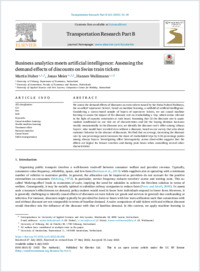Business analytics meets artificial intelligence: Assessing the demand effects of discounts on Swiss train tickets
BP2-STS
- Huber, Martin ORCID University of Fribourg, Switzerland
- Meier, Jonas ORCID University of Amsterdam, Netherlands
- Wallimann, Hannes ORCID Universtity of Applied Sciences and Art Lucerne, Switzerland
- 06.07.2022
Published in:
- Transportation Research Part B: Methodological. - Elsevier BV. - 2022, vol. 163, p. 22-39
Causal machine learning
Double machine learning
Treatment effect
Business analytics
Causal forest
Public transportation
Management Science and Operations Research
Civil and Structural Engineering
English
We assess the demand effects of discounts on train tickets issued by the Swiss Federal Railways, the so-called ‘supersaver tickets’, based on machine learning, a subfield of artificial intelligence. Considering a survey-based sample of buyers of supersaver tickets, we use causal machine learning to assess the impact of the discount rate on rescheduling a trip, which seems relevant in the light of capacity constraints at rush hours. Assuming that (i) the discount rate is quasi-random conditional on our rich set of characteristics and (ii) the buying decision increases weakly monotonically in the discount rate, we identify the discount rate’s effect among ‘always buyers’, who would have traveled even without a discount, based on our survey that asks about customer behavior in the absence of discounts. We find that on average, increasing the discount rate by one percentage point increases the share of rescheduled trips by 0.16 percentage points among always buyers. Investigating effect heterogeneity across observables suggests that the effects are higher for leisure travelers and during peak hours when controlling several other characteristics.
- Faculty
- Faculté des sciences économiques et sociales et du management
- Department
- Département d'économie politique
- Language
-
- English
- Classification
- Economics
- License
- Open access status
- green
- Identifiers
-
- DOI 10.1016/j.trb.2022.06.006
- ISSN 0191-2615
- Persistent URL
- https://folia.unifr.ch/unifr/documents/325124
Statistics
Document views: 71
File downloads:
- 1-s2.0-s0191261522001059-main: 148
